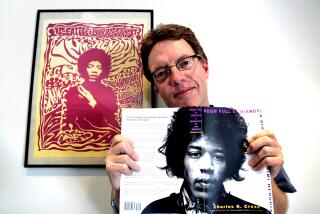This Account of Pop History’s All Shook Up
- Share via
According to a scholarly new tome titled “Great Pop Things,” the history of rock ‘n’ roll starts off something like this:
Elvis Presley was the second white man to invent rock ‘n’ roll (Bill Haley was first, but “he wasn’t very good”), and he lived in Memphis, Egypt. In the 1940s, Elvis saved democracy when he beat up Adolf Hitler. Then the singer got fat, died and became a zombie beatnik poet.
After that, “Great Pop Things” (Verse Chorus Press, $16.95) gets really weird.
The latest in a seemingly endless line of rock ‘n’ roll histories is far different from its predecessors--for one thing, it’s completely bogus, and for another it’s told in comic strip form--but it does find its wry inspiration in the most turgid and grandiose of those past chronicles of pop music.
“It’s all nonsense, just like rock ‘n’ roll,” says Colin B. Morton, the Welsh writer who pens the acerbic, twisted histories of Presley, Bob Dylan, the Beatles and other rock icons. “It all started by rock getting so over-intellectualized and posed and fake.”
Morton was on an eight-hour train trip through Scotland about 11 years ago when he began drafting a ridiculous, lurid history of pop music, an exercise that had begun in a pub with his friend, Chuck Death. He sent the jumble of jokes and riffs to Death, a formally trained painter-turned-punk-rocker who had moved to Chicago from Wales.
“For me, the whole thing started because of Live Aid,” said Death, who sings and plays in the Mekons, a raucously noncommercial band that has stayed together through two decades. “Live Aid is when pop music overstepped its bounds seriously in its pomposity.”
Death suggested creating a cartoon strip and, much to the duo’s surprise, the strip was picked up by several publications, including the L.A. Weekly, where it has run throughout the 1990s. The art is intricate, purposely crude and often gross in its caricatures. The story lines are relentlessly over-the-top and gloriously lowbrow.
The history it presents is tweaked for maximum comedy. In Morton & Death’s version of events, Jimi Hendrix was “descended from black people, Cherokees and Martians”; Jean-Paul Sartre played bass for Led Zeppelin; and the late Frank Zappa knew he arrived in heaven when he heard his songs on the radio for the first time.
The artists targeted by the harsh humor have varied reactions. Polly Jean Harvey, for instance, was delighted when she was featured and cut the cartoon out for her refrigerator, Morton says. Others, such as Morrissey, were less enthused. “He was beside himself with rage because we made his chin so big,” he says. “Some people take themselves very seriously.”
The book collects more than 200 of the strips and is sure to bring the ire of fans who don’t see the humor in events such as John Lennon’s murder.
“Yeah, people want to put a price on our head,” Morton says. “But I like to think John Lennon would have made fun of his own death if he had the chance.” *
More to Read
Sign up for our Book Club newsletter
Get the latest news, events and more from the Los Angeles Times Book Club, and help us get L.A. reading and talking.
You may occasionally receive promotional content from the Los Angeles Times.









